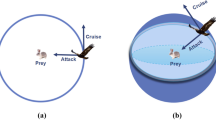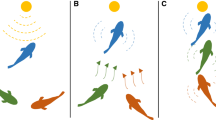Abstract
In the past few decades, meta-heuristic algorithms have become a research hotspot in the field of evolutionary computing. The electric fish optimization algorithm (EFO) is a new meta-heuristic algorithm. Because of its simplicity and easy implementation, it has attracted the attention of researchers. However, it still faces premature convergence and poor balance between exploration and exploitation. To address this problems, an orthogonal electric fish optimization algorithm with quantization (QOXEFO) is proposed in this paper. In QOXEFO, orthogonal cross-design and quantification technique are employed to enhance the diversity of population and convergence precision of EFO. Secondly, the dynamic boundary mechanism is adopted to improve the convergence speed of EFO. At the same time, a sine-based update strategy of active electrolocation is used to change the direction of movement of individuals, thereby helping them jump out of the local optimum. Finally, the CEC2017 benchmark function and Speed reducer design problem are used to verify the performance of the proposed QOXEFO. Experimental results and statistical analysis show that compared with 9 famous evolutionary algorithms, QOXEFO is competitive in solution accuracy and convergence speed.






Similar content being viewed by others
Data availability
Enquiries about data availability should be directed to the authors.
References
Abdollahzadeh B, Gharehchopogh FS (2022) A multi-objective optimization algorithm for feature selection problems. Eng Comput 38:1845–1863
Abdollahzadeh B, Gharehchopogh FS, Khodadadi N, Mirjalili S (2022) Mountain gazelle optimizer: A new nature-inspired metaheuristic algorithm for global optimization problems. Adv Eng Softw 174:103282
Abedi M, Gharehchopogh FS (2020) An improved opposition based learning firefly algorithm with dragonfly algorithm for solving continuous optimization problems. Intell Data Anal 24:309–338
Abualigah L, Diabat A, Mirjalili S, Abd Elaziz M, Gandomi AH (2021) The arithmetic optimization algorithm. Comput Methods Appl Mech Eng 376:113609
Arora S, Singh S (2018) Butterfly optimization algorithm: a novel approach for global optimization. Soft Comput 23:715–734
Askarzadeh A (2016) A novel metaheuristic method for solving constrained engineering optimization problems: crow search algorithm. Comput Struct 169:1–12
Awad NH, Ali MZ, and Suganthan PN (2017) Ensemble sinusoidal differential covariance matrix adaptation with Euclidean neighborhood for solving cec2017 benchmark problems. In: 2017 IEEE Congress on evolutionary computation (CEC), pp 372–379
Cheng M-Y, Prayogo D (2014) Symbiotic organisms search: a new metaheuristic optimization algorithm. Comput Struct 139:98–112
Cheng MY, Prayogo D (2014) Symbiotic organisms search: a new metaheuristic optimization algorithm. Comput Struct 139:98–112
Duan H, Li P (2014) Bio-inspired computation in unmanned aerial vehicles. Springer, Berlin
Fang KT, and Wang Y (1994) Number-theoretic methods in statistics
Formato RA (2007) Central force optimization: a new metaheuristic with applications in applied electromagnetics. Progr Electromagn Res 77:425–491
Gandomi AH, Alavi AH (2012) Krill herd: a new bio-inspired optimization algorithm. Commun Nonlinear Sci Numer Simul 17:4831–4845
Gaurav K, Mishra SK (2015) Nonlinear system identification using clonal particle swarm optimization-based functional link artificial neural network. Adv Intell Syst Comput 332:89–96
Ghafil HN, Jármai K (2020) Dynamic differential annealed optimization: new metaheuristic optimization algorithm for engineering applications. Appl Soft Comput 93:110581
Ghafori S, Gharehchopogh FS (2022) Advances in spotted hyena optimizer: a comprehensive survey. Arch Comput Methods Eng 29:1569–1590
Gharehchopogh FS (2022) Advances in tree seed algorithm: a comprehensive survey. Arch Comput Methods Eng 29:3281–3304
Gharehchopogh FS (2022) An improved tunicate swarm algorithm with best-random mutation strategy for global optimization problems. J Bionic Eng 19:1177–1202
Gharehchopogh FS, Abdollahzadeh B (2022) An efficient harris hawk optimization algorithm for solving the travelling salesman problem. Clust Comput 25:1981–2005
Goldanloo MJ, Gharehchopogh FS (2022) A hybrid OBL-based firefly algorithm with symbiotic organisms search algorithm for solving continuous optimization problems. J Supercomput 78:3998–4031
Hatamlou A (2013) Black hole: a new heuristic optimization approach for data clustering. Inf Sci 222:175–184
Ho SY, Shu LS, Chen JH (2004) Intelligent evolutionary algorithms for large parameter optimization problems. IEEE Trans Evol Comput 8:522–541
Ho SY, Lin HS, Liauh WH, Ho SJ (2008) Opso: orthogonal particle swarm optimization and its application to task assignment problems. IEEE Trans Syst, Man, Cybern–Part A: Syst Humans 38:288–298
Holland JH (1992) Genetic algorithms. Sci Am 267:66–73
Gandomi AH, Yang XS, Alavi Amir Hossein (2013) Cuckoo search algorithm: a metaheuristic approach to solve structural optimization problems. Eng comput 29:17–35
Ireland C (1999) Fundamental concepts in the design of experiments. Technometrics 7:652–653
Jain M, Maurya S, Rani A, Singh V, Thampi SM, El-Alfy ESM, Mitra S, Trajkovic L (2018) Owl search algorithm: a novel nature-inspired heuristic paradigm for global optimization. J Intell Fuzzy Syst 34:1573–1582
Jiang Q, Wang L, Hei X (2015) Parameter identification of chaotic systems using artificial raindrop algorithm. J Comput Sci 8:20–31
Kaveh A, Khayatazad M (2012) A new meta-heuristic method: ray optimization. Comput Struct 112–113:283–294
Kaveh A, Talatahari S (2010) A novel heuristic optimization method: charged system search. Acta Mech 213:267–289
Kennedy J, and Eberhart R (2002) Particle swarm optimization. In: Proceedings of ICNN’95–International conference on neural networks, pp 1942–1948
Khishe M, Mosavi MR (2020) Chimp optimization algorithm. Exp Syst Appl 149:110352
Kirkpatrick S, Vecchi MP (1983) Optimization by simulated annealing. Science 42:671–680
Leung YW, Wang Y (2002) An orthogonal genetic algorithm with quantization for global numerical optimization. IEEE Trans Evol Comput 5:41–53
Li X, Zhang J, Yin M (2014) Animal migration optimization: an optimization algorithm inspired by animal migration behavior. Neural Comput Appl 24:1867–1877
Lih-Yuan D (2000) Orthogonal arrays: theory and applications. Technometrics 24:532
Liu R, Wang L, Ma W, Mu C, Jiao L (2014) Quadratic interpolation based orthogonal learning particle swarm optimization algorithm. Nat Comput 13:17–37
Mezura-Montes E, and Coello CAC (2005) Useful infeasible solutions in engineering optimization with evolutionary algorithms. In: Mexican international conference on artificial intelligence. Springer, pp 652–662
Mirjalili S, Lewis A (2016) The whale optimization algorithm. Adv Eng Softw 95:51–67
Mohammadzadeh H, Gharehchopogh FS (2021) Feature selection with binary symbiotic organisms search algorithm for email spam detection. Int J Inf Technol Decis Mak 20:469–515
Mohmmadzadeh H, Gharehchopogh FS (2021) An efficient binary chaotic symbiotic organisms search algorithm approaches for feature selection problems. J Supercomput 77:9102–9144
Nachtsheim CJ (1985) Orthogonal fractional factorial designs. Wiley, Hoboken
Nachtsheim CJ (1985) Orthogonal fractional factorial designs. Wiley, Hoboken
Naseri TS, Gharehchopogh FS (2022) A feature selection based on the farmland fertility algorithm for improved intrusion detection systems. J Netw Syst Manage 30:40
Nelson PR (1991) Design and analysis of experiments. J Quality Technol 23:375–375
Qin Q, Cheng S, Zhang Q, Wei Y, Shi Y (2015) Multiple strategies based orthogonal design particle swarm optimizer for numerical optimization. Comput Oper Res 60:91–110
Rashedi E, Nezamabadi-pour H, Saryazdi S (2009) Gsa: a gravitational search algorithm. Inf Sci 179:2232–2248
Rizk-Allah RM (2017) Hybridizing sine cosine algorithm with multi-orthogonal search strategy for engineering design problems. J Comput Des Eng 21:249–273
Simon D (2016) Biogeography-based optimization. In: International conference on mobile computing and networking, pp 702–713
Storn R, Price K (1997) Differential evolution–a simple and efficient heuristic for global optimization over continuous spaces. J Global Optim 11:341–359
Stromberg AJ (1994) Number-theoretic methods in statistics. Technometrics 38:189–190
Ullah ASSMB, Sarker RA, Cornforth D, and Lokan C (2007b) An agent-based memetic algorithm (ama) for solving constrained optimazation problems. In booktitleIEEE Congress on Evolutionary Computation (p. all)
Ullah ASSMB, Sarker, RA, and Cornforth D (2007a) A combined MA-GA approach for solving constrained optimization problems. In: IEEE/ACIS international conference on computer and information science, p all
Wang Y, Cai Z, Zhang Q (2012) Enhancing the search ability of differential evolution through orthogonal crossover. Inf Sci 185:153–177
Wu Q (1978) On the optimality of orthogonal experimental design. Acta Math Appl Sinica 1:283–299
Yang XS (2010) A new metaheuristic bat-inspired algorithm. Comput Knowl Technol 284:65–74
Yang XS, Gandomi AH, Talatahari S, Alavi AH (2012) Metaheuristics in water resources. Geotechnical and Transportation Engineeringr Elsevier, Waltham
Yilmaz S, Sen S (2019) Electric fish optimization: a new heuristic algorithm inspired by electrolocation. Neural Comput Appl 32:11543–11578
Zeng S, Kang L, Ding L (2004) An orthogonal multi-objective evolutionary algorithm for multi-objective optimization problems with constraints. Evol Comput 12:77–98
Zhan ZH, Zhang J, Li Y, Shi YH (2011) Orthogonal learning particle swarm optimization. IEEE Trans Evol Comput 15:832–847
Zhan ZH, Zhang J, Li Y, Shi YH (2011) Orthogonal learning particle swarm optimization. IEEE Trans Evol Comput 15:832–847
Zhang Q, Leung YW (1999) An orthogonal genetic algorithm for multimedia multicast routing. IEEE Trans Evol Comput 3:53–62
Zhang Q, Peng W, and Wu S (1996) Genetic algorithm + orthogonal design method: a new global optimization algorithm. In: Proceedings of the 4th Chinese joint conference of artificial intelligence, pp 127–133
Funding
The authors wish to acknowledge the National Natural Science Foundation of China (Grant No. U1731128); the Natural Science Foundation of Liaoning Province (Grant No. 2019-MS-174); the Foundation of Liaoning Province Education Administration (Grant No. LJKZ0279, 2019LNJC12) for the financial support.
Author information
Authors and Affiliations
Contributions
DW: Conceptualization, Methodology, Investigation, Data curation, Software, Visualization, Writing–original draft. HL: Conceptualization, Methodology, Software, Resources, Writing–original draft, Formal analysis, Supervision, Project administration, Funding acquisition. LT: Methodology, Formal analysis, Resources, Supervision, Project administration, Funding acquisition. GD: Data curation, Writing–Original draft preparation.
Corresponding author
Ethics declarations
Conflict of interest
The authors declare that they have no conflict of interest.
Informed consent
Informed consent was obtained from all individual participants included in the study.
Human or animal rights
This article does not contain any studies with human participants or animals performed by any of the authors.
Additional information
Publisher's Note
Springer Nature remains neutral with regard to jurisdictional claims in published maps and institutional affiliations.
Rights and permissions
Springer Nature or its licensor (e.g. a society or other partner) holds exclusive rights to this article under a publishing agreement with the author(s) or other rightsholder(s); author self-archiving of the accepted manuscript version of this article is solely governed by the terms of such publishing agreement and applicable law.
About this article
Cite this article
Wang, D., Liu, H., Tu, L. et al. An orthogonal electric fish optimization algorithm with quantization for global numerical optimization. Soft Comput 27, 7259–7283 (2023). https://doi.org/10.1007/s00500-023-07930-6
Accepted:
Published:
Issue Date:
DOI: https://doi.org/10.1007/s00500-023-07930-6




